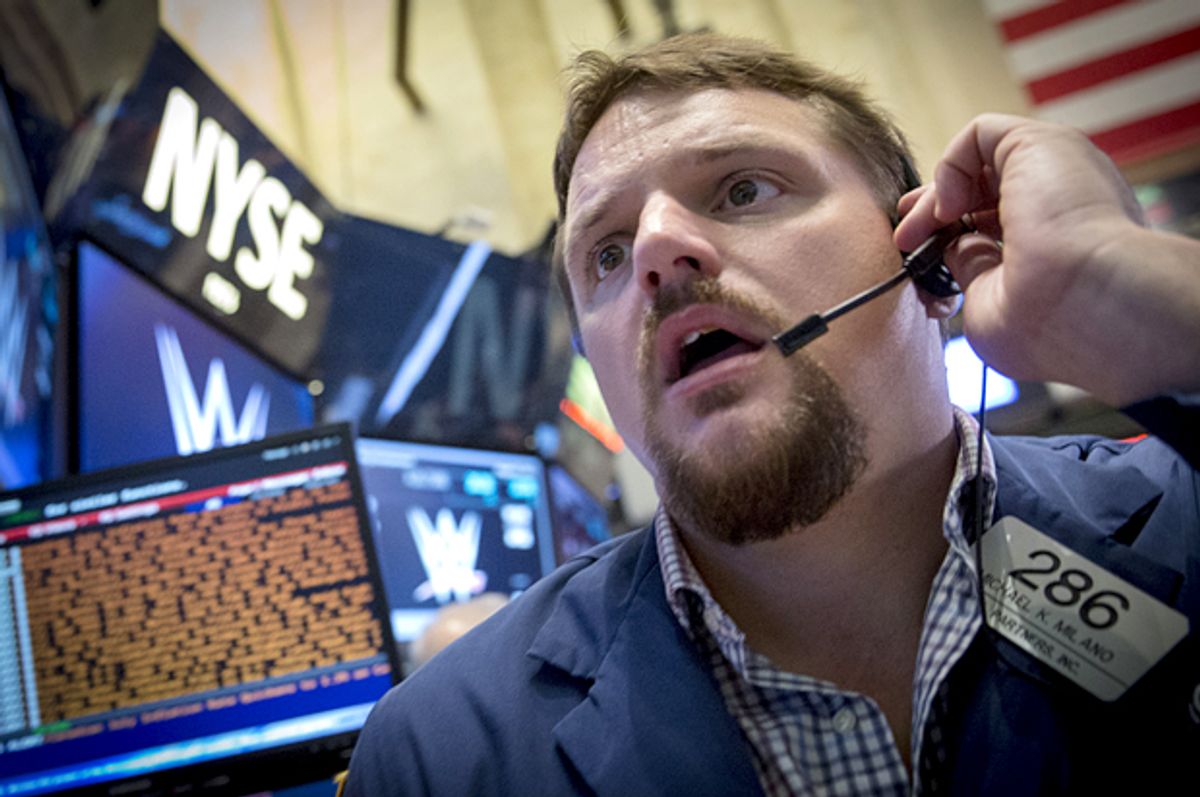It’s been a wild ride for markets this week, thanks in part to FBI Director James Comey’s surprise announcement last week about the discovery of new emails related to Hillary Clinton’s email server controversy, which, if polls are any indication, improved Republican Donald Trump’s chances to win the White House on Tuesday. Investors are bracing for what could be the most volatile post-election trading day ever.
According to a Credit Suisse analysis of index options (financial derivatives that allow investors to bet on the future value of a market index), the benchmark S&P 500 index of America’s biggest companies could rise or fall by 3.3 percent on Wednesday in reaction to the election results. Such an election-related swing in the market would be unprecedented, well above the average 1.1 percent move that follows a normal presidential race. Other estimates are less sanguine: Citi analysts warn of an immediate 5 percent drop should Trump win the election. Others suggest the decline could be even greater.
As Election Day approaches, anxieties are running high, leading to one of the longest selloffs of stocks in the S&P 500 index since the financial crisis eight years ago. Friday’s upbeat monthly U.S. jobs report, which showed robust gains in both hiring and wage growth, helped to lift U.S. markets during intraday trading, but the S&P 500 ended Friday down a slight 0.17 percent, its ninth consecutive decline and the longest losing streak since 1980.
The U.S. election jitters aren’t limited to the U.S.: Asian and European stock markets fell Friday, too, while the benchmark Euro Stoxx 600 shed 3.5 percent this week, touching its lowest level since July. This scramble sent the VIX, a widely watched index that rises when market volatility is high, above 22 points on Friday, up from 13 over the past five weeks, its highest point since Britain voted in June to leave the European Union.
Safe-haven bets — low-yield, highly stable investments — have risen, too. U.S. Treasury funds gained $2.3 billion in five days, the largest influx of cash since the first week of July following the Brexit vote, as investors fled volatile markets to the safety of low-yield U.S. government debt. On Friday, the price of a troy ounce of gold was up about $30 from Monday (gold prices tend to rise when investors are on edge).
All of this is classic "risk-off" behavior, where investors flee riskier bets like low-rated corporate or high-yield municipal bonds. Clearly, the investment professionals are spooked — but what does this mean for average investors?
“It think it’s good to close your ears,” said Bill Stone, chief investment officer at PNC Financial Services Group. “Politics bring in a lot of emotion and bringing those emotions into investment decisions is not likely to help you, frankly.”
Stone says there are many factors that help determine how investments react to election outcomes, but reacting to the immediate results is likely to do more harm than good. It’s better to assess the situation after the initial reaction to see if there’s a need to shift investments. For example, energy and bank stocks could be adversely impacted by a Clinton victory and a Democratic takeover of the Senate. Health insurance stock would take a hit if Trump wins and the Republicans retain control of the Senate, which boosts the chances of a repeal of the Affordable Care Act.
But interestingly, Stone looked at historical data and found that markets tend to perform better under gridlock situations, when Congress and the White House are controlled by different parties. The reason for this goes back to uncertainty — radical policy decisions that could impact the markets are unlikely if neither party can implement its agenda without the other.
A Trump victory would clearly create the most uncertainty, and the most post-election panic. But if you own any equities, it’s best to hold back and wait until the volatility of the election settles before assessing the options.
By some measures, Trump’s bold propositions — such as starting trade wars with China and Mexico and crippling the U.S. budget with massive tax breaks for the rich — would be a disaster for the U.S. and global economies. But Trump would need Congress to support him, and it’s unlikely that the GOP has the appetite to rally behind his more radical proposals, like rounding up and deporting 11 million undocumented immigrants, erecting a $25 billion wall between the U.S. and Mexico, or punishing U.S. companies for investing abroad.
“Trump can says what he’s going to do, but he can’t do it because the Republicans aren’t likely support him,” Stone said. “There are some things presidents can do on their own, but there’s a lot they can’t do.”
As one of the most unusual and tumultuous presidential campaigns in U.S. history winds down, the best advice for the average investor right now is to turn off the 24-7 financial news cycle, wait for markets to settle down from their current freakout and breathe a sigh of relief that at least this ridiculous election cycle is almost over.



Shares